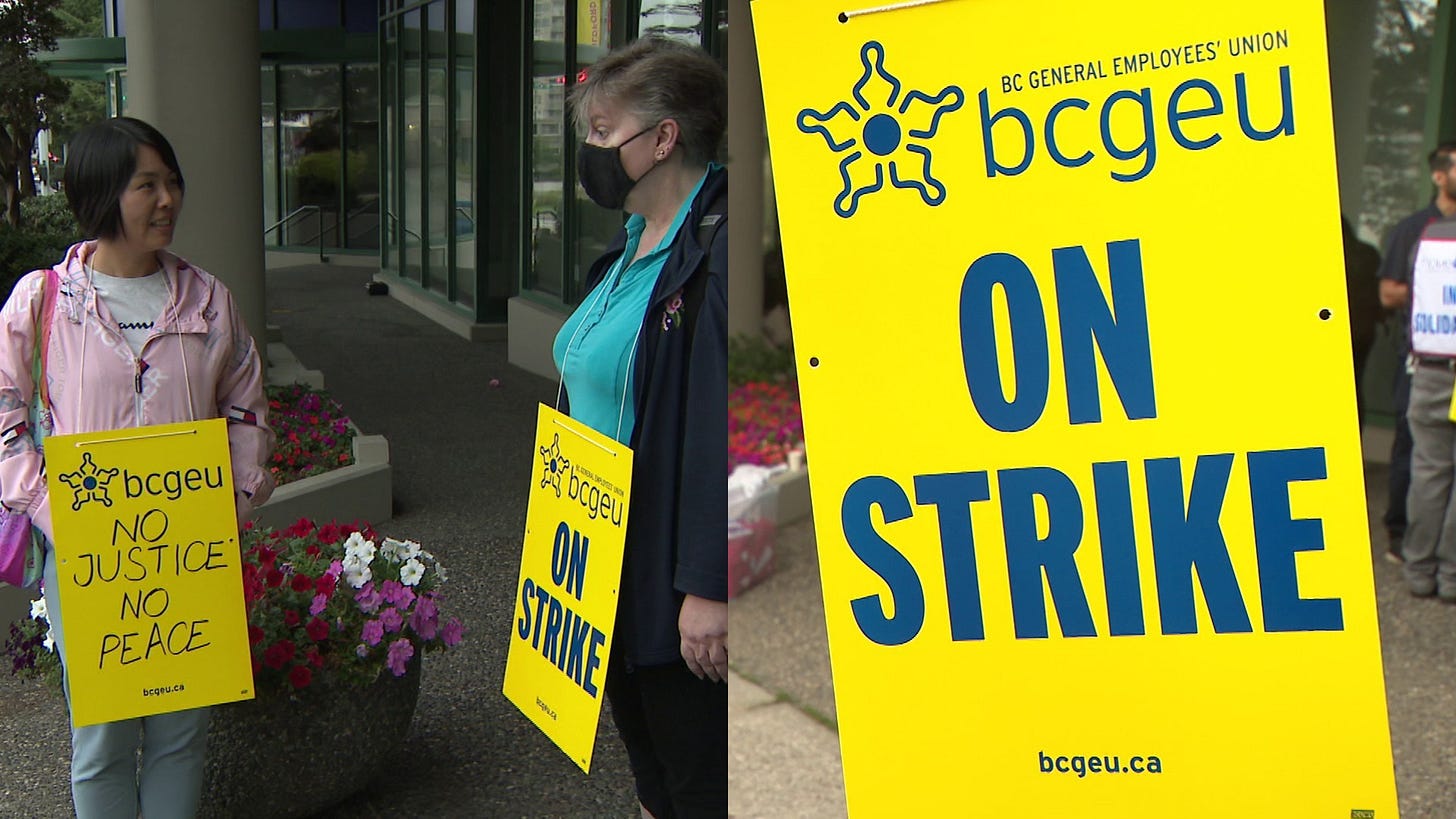B.C. Public Workers' Strike Escalates
by Gary Porter
After more than 5 weeks of escalating strikes and overtime bans, the B.C. General Employees’ Union (BCGEU) has mobilized more than 13,000 workers out of the 34,000 work force at more than 28 different sites across the province. Each day the scope of the strike expands in an attempt to pressure David Eby’s NDP government back to the bargaining table.
Job action sites include the liquor and cannabis distribution centres, mining sector, (where a number of projects are being fast tracked), the Royal BC Museum, IMAX Theatre, BC Archives, Ministry of Citizens’ Services offices, as well as the Gaming Policy and Enforcement Branch.. On Sept 23, 2,800 workers joined the strike in Health, Forests, Transportation and Vehicle Safety. On Sept 24, 600 more workers at 25 Liquor retail stores walked off the job.
The union wants wage increases in line with inflation and cost-of-living, while the NDP government claims that it wants an agreement that’s “fair to workers and to the public.” A recent Leger poll found that 81% of British Columbians support public service workers wage increases at or above the rate of inflation.
The BC Government Employees’ Union (BCGEU) strike involves several key issues, primarily centered on wages, remote work protections, and essential service designations. Here’s a breakdown of the main points of contention:
1. Wages and Cost-of-Living Adjustments
The union is fighting for an 8.25% wage increase over two years, along with cost-of-living allowances (COLA) to protect against future inflation. The provincial government has offered a mere 4.5% compensation increase over two years, which includes some cost-of-living adjustments. The government offer is below forecasts for inflation over the next 2 years. The union argues that low wages have led to recruitment and retention issues, with half of its members living paycheck to paycheck and 70% spending over 30% of their pre-tax income on housing.
2. Remote Work and Flexible Work Arrangements
The BCGEU is pushing for formal contract language to guarantee remote work options and protect against arbitrary management decisions. This includes designating full and partial remote positions. Business groups, like the Greater Victoria Chamber of Commerce, oppose expanded remote work, arguing it reduces foot traffic and harms downtown economies.
3. Essential Service Designations
The strike has disrupted some services, leading to negotiations over essential service designations. For example, meat inspectors were recently classified as “essential” after ranchers raised concerns about halted inspections affecting slaughterhouses and livestock sales auctions operations. The government maintained that food safety was not impacted by the absence of mandatory meat inspection services!
4. Government Fiscal Concerns and Hiring Freeze
The government cites fiscal challenges, including a hiring freeze imposed in February, as reasons for limiting wage increases. The union argues that the hiring freeze exacerbates understaffing (B.C. has one public servant per 186 residents vs. the national average of 1 per 146) and harms public service delivery.
The strike highlights broader tensions between public sector workers’ demands for fair compensation and flexible work conditions and the government’s concerns about “fiscal responsibility and economic impacts on businesses.”
Although the NDP is a trade union-based party, a labour party, its leadership is social democratic. They seek only minor reforms to the failing, exploitative and oppressive capitalist system based on private ownership and the profit motive. When in office, they strive for the approval of the business press and business groups, as “responsible” and “prudent” managers of the economy. They refuse to adequately tax high incomes and wealth, attempting to pay for weakening social programs on the back of the workers.
BC supporters of Yves Engler’s socialist campaign for Leader of the federal NDP support the workers’ demands. Socialists join the union picket lines and denounce Eby’s ongoing efforts to sustain high business profits for BC capitalists at the expense of the public interest and workers’ livelihoods.


